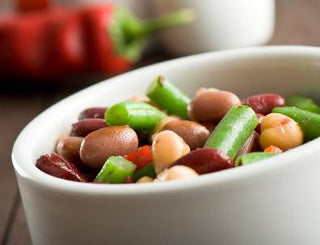Beans, beans, the miracle food, the more you eat, the lower your cholesterol and risk of heart attack? According to recent research, yes! Coupled with a little weight loss and exercise, you can really reduce your chances of developing cardiovascular disease.
A new study published in the Canadian Medical Association Journal found that a diet rich in pulses or legumes (beans, chickpeas, lentils, and peas) can lower LDL cholesterol and its corresponding risk for cardiovascular disease.
Beans, Peas & Lentils Lower Bad Cholesterol
Researchers conducted a meta-analysis of 26 studies from the United States and Canada that covered 1,037 participants, about equal numbers of men and women, who were an average of 51 years old.
Analysis of the data showed a strong association between eating one serving of legumes, or 4.5 oz. daily and lowering low density lipoproteins (LDL), the “bad” type of cholesterol that collects in blood vessel walls.
“Eating beans could also improve other cardiometabolic risk factors including body weight, blood pressure and blood sugar control. “
Over a follow-up period averaging about six weeks, those who ate a serving of legumes lowered their LDL levels by about 5%, and as a result, lowered their risk of developing cardiovascular disease or having a major cardiovascular event like a heart attack by about 5-6%.
The benefits appeared to be greater in men than in women, and while the reason for this was unclear, researchers suggested it might be due to men having higher overall levels of LDL cholesterol than women or more unhealthy eating habits.
They concluded that the benefit could be the result of the high fiber content of pulses, and suggested that eating beans could also improve other cardiometabolic risk factors including body weight, blood pressure and blood sugar control.
Losing Weight at Any Age Yields Cardiovascular Benefits
In another study published in The Lancet Diabetes & Endocrinology, researchers found that losing weight at any age could result in long-term cardiovascular benefits.
Researchers analyzed data for about 1,300 men and women followed for over 60 years as part of the UK Medical Research Council’s National Survey of Health and Development. They found that the longer one was fat in adulthood, the greater the cardiovascular problems later in life such as thickened carotid artery walls (carotid intima media thickness, or cIMT, a surrogate marker for cardiovascular events), elevated blood pressure, and increased risk of diabetes.
However, they also found that adults who drop a BMI category at any time during adulthood, meaning going from obese to overweight or from overweight to normal, they reduced their risk of cardiovascular issues even if they regained some weight.
Physical Exercise in Middle Age Has Heart Health Benefits
And yet another study of over 32,000 women by researchers at the University of Queenland, published in the British Journal of Sports Medicine, found that physical inactivity was the leading risk factor for heart disease at every age from the early 30s to the late 80s, greater than smoking, obesity or high blood pressure. In fact, being inactive raised women’s risk of heart disease an average of 33% for middle-aged women and 24% for older women. Put another way, staying physically active is far more likely to determine your risk of heart disease than any other well-known factor.
The Bottom Line
What do all these studies tell us? To reduce the risk of cardiovascular disease – the number one cause of death for women – it’s a three-fold plan: eat healthfully, exercise, and if necessary, lose weight.
Your dietary intake of cholesterol should be limited to less than 300mg per day for healthy individuals, and less than 200mg a day for those who already have cardiovascular disease, diabetes, or high LDL levels.
For a healthy heart, limit and/or avoid these LDL cholesterol-raising foods:
- Saturated fats like butter, bacon drippings, lard, palm oil, and coconut oil.
- Trans fats or partially hydrogenated oils.
- Fatty and/or processed meats like ground beef, ribs, steak, sausage, bacon, and hot dogs.
- Egg yolks, which contain 210 mg in just one yolk.
- Dairy products that contain more than 1% milk fat, like whole milk, yogurt, cheeses, whipped cream, and ice cream.
Instead, try these cholesterol-friendly foods:
- Pulses, like beans, lentils, and peas, which are rich in protein and soluble fiber, and help you feel fuller, longer (leading to weight loss), and keep things moving along in the bowel.
- Nuts, like almonds, walnuts, and peanuts. Eating 2 oz. per day can help lower LDL up to 5%.
- Liquid vegetable oils, like olive, canola, sunflower, or safflower, which help lower LDL when used in place of butter, lard, or shortening.
- Apples, grapes, strawberries, and citrus fruits which are rich in pectin, a type of soluble fiber that lowers LDL.
- Oily fish, which are rich in LDL-lowering omega-3 fats. Omega-3s reduce triglycerides in the bloodstream and help prevent abnormal heart rhythms.
By adding in at least 20 minutes of exercise each day, you can increase your chances for weight loss and dramatically improve your chances for a healthy heart!

